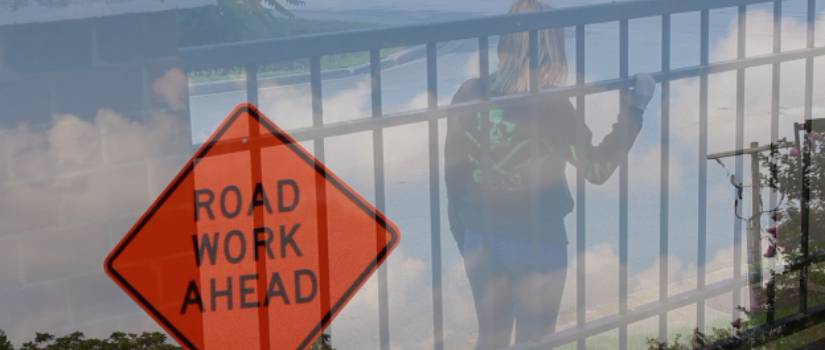Women's and Gender Studies Affiliate Faculty, Dr. Olga Ivashkevich, discusses the power of community-based research
When Dr. Olga Ivashkevich first arrived on USC campus in 2008 as a new Assistant Professor in Art Education, the Women’s and Gender Studies Program was one of her first stops to become Affiliate Faculty. While there, she learned about the Women’s Well-Being Initiative (WWBI), the program’s community initiative for women and girls established by two WGST core faculty, Dr. Lynn Weber and Dr. DeAnne Messias in 2001. One of WWBI's long-standing collaborations is with the local Juvenile Arbitration Program of Lexington County, which is a diversion and rehabilitation program for first-time non-violent law offenders, working with adolescent girls in the program. Kathryn Barton, the program’s director, is a strong ally who made this partnership possible.
Ivashkevich recalls, “When they asked me if I was interested I said, of course! I am a feminist art educator and I immediately got involved and started designing the curriculum for the program.” As a social justice oriented educator and scholar, Ivashkevich’s research and work with the Women’s Well-Being Initiative’s program for girls in Juvenile Arbitration is deeply cooperative and community-oriented.
“We see it as girls taking back their voice, and expressing their voices directly through their own productions... We want them to create new self-representations, and new worlds.”
The arts-based workshops she collaboratively designed and runs with the help of volunteers and graduate assistants, engages participant girls in a dialogue about gender and social justice through self-reflexive, issues-based arts and digital media-making including poetry, multi-media collage, sculpture, photography, and video. During the four 3-hour sessions, girls are invited to unpack oppressive feelings, events, socioeconomic conditions, and media representations that permeate their daily lives, and respond to these obstacles by creating an artwork. They begin by mapping out their everyday obstacles and challenges and then make art addressing the issues most affecting their lives. “We see it as girls taking back their voice, and expressing their voices and social concerns directly through their own productions,” Ivashkevich says. “We see art as a form of social action; it enacts change in the girls to see themselves as having power over their lives, to shape their life conditions, which are often very difficult.”
“We see art as a form of social action; it enacts change in the girls to see themselves as having power over their lives, to shape their life conditions, which are often very difficult.”
During the academic year, the workshops use traditional art media, but each summer, Ivashkevich teaches a digital media art workshop using innovative media techniques some of which she learned from an experimental digital media artist and former USC graduate student, O.K. Keyes. She says, “The girls’ media production is very important to us because they can express issues that impact girls’ and women’s lives. Most of the media producers are men, and girls’ and women’s voices and perspectives rarely make it to the screen. Digital media provide a forum for girls to speak about gender stereotypes, to challenge media representations of girls ‘in trouble,’ and to reimagine their present and future without the limiting societal labels.“
The art workshops and program as a whole have created positive change in the girls’ daily lives. Ivashkevich says, “There’s very little percentage of girls that re-offend after going through the program. The people who work with the girls really believe in them, and the arts classes are instrumental in this as well. The girls grow emotionally and mentally, they start believing in themselves, and gain more confidence.”
“This work has broadened my scholarship and thinking, expanding into feminist criminology and intersectionality, where race, class, and gender are intertwined.”
The girls in the program are not the only ones changed by the art workshops; Ivashkevich says her experience working as a participatory researcher with the Women’s Well-Being Initiative has influenced her own scholarship as well: “I feel as a scholar, I grew a lot because of my involvement with this program. This work has broadened my scholarship and thinking, expanding into feminist criminology and intersectionality, where race, class, and gender are intertwined.”
Participatory action or community-based research is invaluable in its combination of giving back to the community while also producing quality research, Ivashkevich says. And the Women’s and Gender Studies Program’s Women’s Well-Being Initiative is well-suited for faculty to become engaged in participatory action research. So how can faculty get involved?
“We need new faculty members to develop strong, long-lasting collaborations with communities. And we are open to all kinds of ways of working with the community to advance the issues of gender and justice.”
“Dr. Weber and Dr. Messias who created the WWBI thought that academics had an additional calling besides research production: to give back to the community,” Ivashkevich says. “We welcome any faculty who is interested in community-based or action-based research to get involved in the Women’s Well-Being Initiative and start developing their own research projects within our framework. We have initial funding to help establish the site. Being affiliated with the Women’s Well-Being Initiative gives faculty a connection to a well-known organization with resources to help develop community-based research. We need new faculty members to develop strong, long-lasting collaborations with communities. And we are open to all kinds of ways of working with the community to advance the issues of gender and justice. It’s not solely an arts-based initiative, it's open to all disciplines.”
For examples of art and digital media projects and names of collaborators and student volunteers, visit Dr. Ivashkevich’s website. You can also read more about the Women’s Well-Being Initiative and other present and past projects here.
By Lorena Hildebrandt
September 17, 2018
